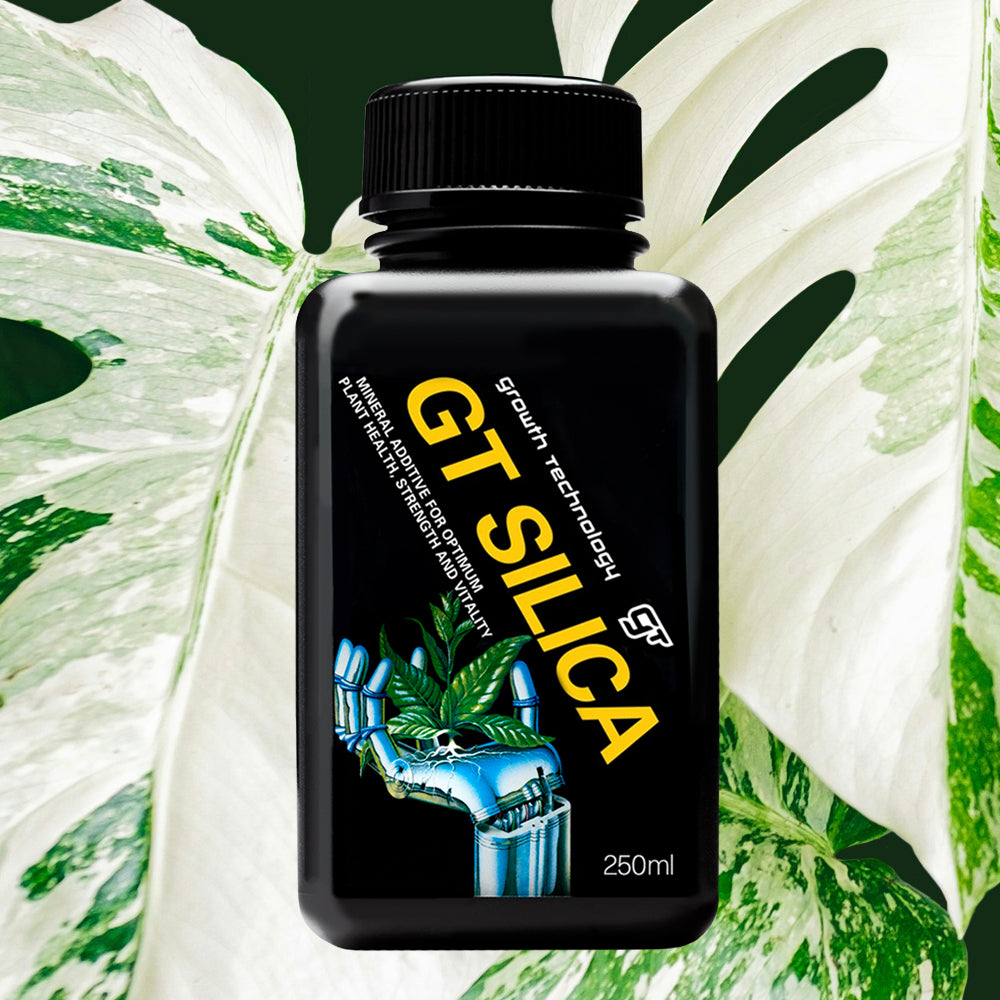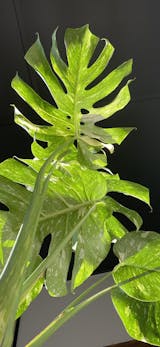Growth Technology SILICA 250ml
- Regular Price
- $14.00
- Sale Price
- $14.00
- Regular Price
- Unit Price
- Translation missing: en.general.accessibility.unit_price_separator
From the clever team at Growth Technology comes GT Silica, known as 'Nature's Bodyguard'. Silica strengthens and protects plants. Making plant tissue stronger, helping protect against premature browning, building a protective barrier against biting and sucking pests and aiding recovery.
GT SIlica is now available in the new 250ml size (this size), or original 1 litre available here. One 5ml pipette included FREE with every GT order.
Silica makes plants stronger
Silica is a natural powerhouse nutrient abundant outdoors but missing indoors. Adding Silica to your feeding routine gives indoor plants the protection that nature would normally provide.
Silica makes plants both physically stronger and supports stronger defences against pests (especially sap-sucking pests), fungal diseases (such as root rot and powdery mildew), and environmental stresses (such as temperature stress and moisture stress including over- and under-watering).
Protect variegated plants
As well as the extensively studied benefits of silica above, silica has more recently started being used for making variegated foliage stronger. Hobbyists are finding silica helps prevent or delay premature browning of naturally weaker variegated leaves.
Which plants need GT Silica?
All plants benefit from Silica but not all plants need it. Outdoors if you test your soil you may find silica in abundance due to soil water, however indoors silica is not naturally available. Silica can be used as a pro-active protectant for any plant not already getting silica naturally, or where soil water is deficient.
When should plants be given silica?
Although silica can be used defensively for plants under stress or attack, silica is best used proactively 'little and often' as silica is not a mobile nutrient (meaning plants can't correct a deficiency by shifting silica within itself). Plants rely on their substrate to meet their silica needs.
Is silica best given via the roots or leaves?
Silica is best made available to plants via the roots, but when more urgent action is required, use GT Foliar instead which provides a boost of silica (and more), in the form of a foliar spray for more immediate uptake in the short-term. Then continue with GT Silica long-term provided through the roots.
What's in GT Silica?
A concentrated blend of silicic acid and potassium hydroxide, called potassium silicate, considered the superior form of silica for plants.
Silica for environmental stress
Plants deposit silica in their cell walls, strengthening roots, stems and leaves, acting as a protective barrier between the plant and the environment. Silica increases physical strength for plants prone to weak stems, browning, drooping or wilting leaves.
That protective barrier also helps plants handle water and temperature stress. Reducing the impact of under- and over-watering as well as extreme hot or cold temperatures.
Silica for pests
Silica is part of nature’s defence system against pests that feed on roots such as fungus gnat larvae and root mealy, as well as sap-sucking pests that feed on stems and leaves, including mealybugs, aphids, thrips, scale and spider mites.
As well as making the external barrier harder for pests to penetrate and feed, silica has also been shown to make plants less palatable and harder to digest, slowing insect growth and reproduction.
Silica's also been shown to more quickly block the flow of sap when a plant is under attack from sucking insects like aphids and mealybugs. Plants have also been shown to continue to send silica to damaged areas after the threat is gone, so silica may also assist with faster recovery.
Directions for use
How much silica to use
For plants in potting mix, use 2mls to 3mls GT Silica to 1 litre water.
For hydroponics and semi-hydroponics use 5mls GT Silica per 1 litre of water.
Always add silica first
If you're supplementing with silica by itself (watering it in separate to your fertiliser), add the silica to your water, stir well, wait 15 minutes, stir well again and water.
If you're mix-feeding - adding both silica and fertiliser to the same water - always add silica first, stir well, wait 15 minutes before adding your fertiliser (stick with the GT Focus range of fertilisers), stir well again, then rest for 15 minutes before watering.
Why the 15 minute wait?
15 minutes is the average time smaller amounts of tap water takes for pH to stabilise. If using Reverse Osmosis water (without minerals in it), it won't naturally buffer pH and is more sensitive to pH fluctuations, so you'll need test pH and may need to adjust with pH up or down when using RO water. Tap water pH is more stable.
How often should plants get silica?
Silica is not a mobile nutrient. Plants rely on a regular supply. For best results, add GT Silica every time you water or every week.
Silica in soil vs semi-hydro
When using silica for plants growing in organic or organic-based substrates - like soil, peat, coco chips and bark - the substrate will also naturally buffer pH. GT Focus fertilisers also buffer pH to the slightly acidic ideal pH that plants need for the best uptake of nutrients.
However, if you're growing hydroponically or in a semi-hydro substrate like Leca or Pon, you will need to test and adjust the pH of your nutrient solution (as you should when using any nutrients). Pon with zeolites in the mix has pH buffering capacity but testing and adjusting the pH of your nutrient solution is still good practice. Leca isn't as pH stable so testing and adjusting pH in your nutrient solution is needed.
Safety first
Silicates are very alkaline in their concentrated form in the bottle. Either wear gloves when handling the liquid, or just take extra care not to spill on your skin (or clothes). It's best to just use a 5ml pipette (supplied free) to get how much you need straight from the bottle. Safety data sheet available here.





